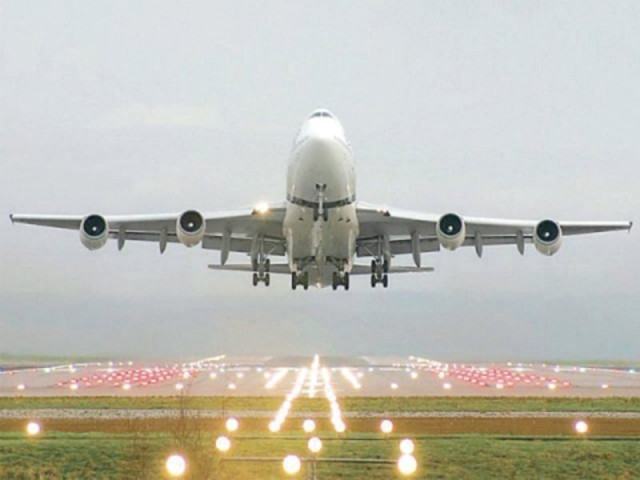Development schemes: New Gwadar Airport gets ECNEC’s approval
Committee gives go-ahead to nine mega projects costing Rs105b.

Oman has promised a grant of $17.5 million for the new airport while the Civil Aviation Authority will bear one-tenth of the total cost from its resources. STOCK IMAGE
The Executive Committee of National Economic Council (Ecnec) on Monday approved nine mega development schemes requiring a total expenditure of Rs105 billion including construction of the New Gwadar International Airport at a cost of Rs26.6 billion.
Called the apex project-sanctioning authority, Ecnec directed the Aviation Division to change the design of the Gwadar project in order to facilitate the landing and take-off of Boeing 777 aircraft.
The Planning Commission proposed to revise down the project cost to Rs21.5 billion, but because of further modifications in the design, it would cost no less than Rs26.6 billion, said an official of the Ministry of Finance.

As part of its $46.6 billion investment programme for Pakistan, China is expected to provide $662 million in assistance for developing land, airport and seaport facilities in Gwadar.
Oman has promised a grant of $17.5 million for the new airport while the Civil Aviation Authority will bear one-tenth of the total cost from its resources.
Initially, Ecnec had approved the Gwadar airport in January 2010 at a cost of Rs7.7 billion. Since then, the project has been facing delays because of its cost estimate and design structure. Until June last year, Rs803 million had been spent on its development.
The project featured on the PML-N government’s priority list following a strategic partnership accord between Pakistan and China for establishing an economic corridor.
Under the partnership, China is planning to use the Gwadar Port for developing its western parts, which have been roiled by insurgency and separatist movement because of its largely underdeveloped status.
Ecnec gave its seal of approval to the construction of an expressway on the east bay of Gwadar Port at a cost of Rs14.1 billion. China will provide Rs13.5 billion for the project, part of the early harvest programme of the economic corridor.
The committee considered and cleared the development of Gorkin-Matiltan hydropower project of 84 megawatts at a rationalised cost of Rs20.7 billion.
The project will bring an annual income of Rs3.5 billion after completion in about seven years. A fifth of the cost will come from the Annual Development Plan of Khyber-Pakhtunkhwa and the remaining 80% will be injected in terms of loan from the Hydel Development Fund of the province.
A project for the construction of 73.7km Torkham-Jalalabad road, costing Rs7.4 billion, also won Ecnec’s nod. The need of funds is proposed to be met out of the $500 million pledged by Pakistan for the reconstruction and rehabilitation of Afghanistan.
The committee cleared the Balochistan educational project with an expenditure of Rs3.6 billion. Finances are being arranged in the shape of a grant from the Global Partnership for Education under the supervision of the World Bank with guidelines for the province to provide access to primary education.
The project will cover the entire 32 districts of Balochistan. A total of 2,000 mixed-gender primary schools will be established and 60 girls’ schools will be upgraded. This will bring 100,000 out-of-school children to educational institutions and will provide employment to 4,000 teachers.
A project for the rehabilitation, upgrading and conservation of 400 coaches of the Pakistan Railways also got Ecnec’s green signal. With an investment of Rs5.2 billion, 400 coaches will be rehabilitated. Ecnec approved, in principle, the construction of Amri-Kazi bridge over Indus River at a cost of Rs7.2 billion. The federal government will bear half of the cost and the rest will be paid by the Sindh government.
With spending of Rs7.7 billion, the water sector capacity building and advisory services project was also cleared. The project will lead to improvement in water resources management and investment planning in the Indus River basin in order to strengthen the water sector’s sustainability.
The committee cleared the 500-kilovolt sub-station Faisalabad west project at a rationalised cost of Rs9.4 billion.
Published in The Express Tribune, January 13th, 2015.
Like Business on Facebook, follow @TribuneBiz on Twitter to stay informed and join in the conversation.



















COMMENTS
Comments are moderated and generally will be posted if they are on-topic and not abusive.
For more information, please see our Comments FAQ